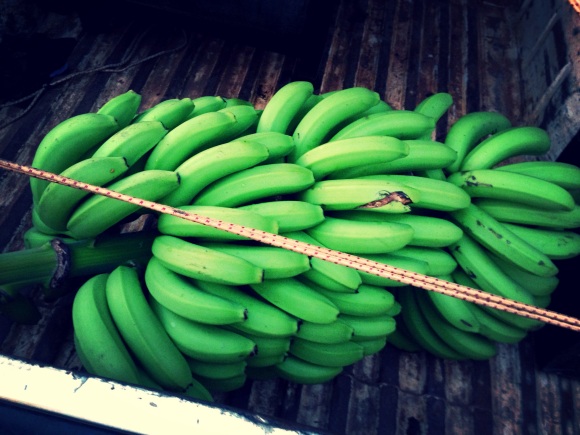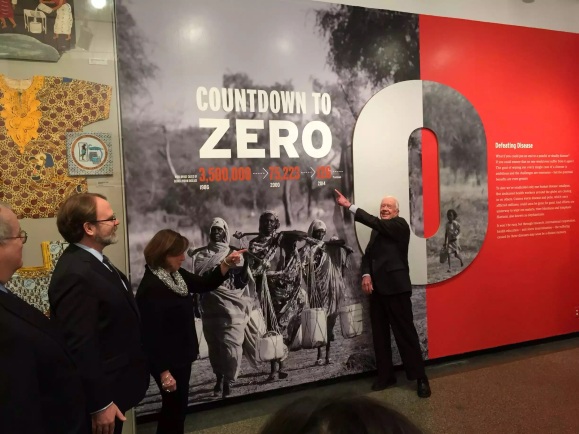
I’m tucked comfortably in the back of a four-door truck barreling down the bumpy main street of Namapa. On my left and right are the far reaches of the market, where onlookers watch as our truck grabs and spits mud and dirt following the day’s rain. The driver and his companion are deep in conversation, and I’m leaning halfway out the window, smiling and waving at staring kids and teenagers. Most of them respond, while others continue to stare, give quick, short glances, or throw a gesture that makes the group of them laugh and run away.
When Steven asked me to come along to visit the banana farm, I was elated. I had only heard of the farm from friends who work it, the lady who sells the bananas under a large, shaded tree near the hospital, and, of course, Steven, who works there frequently.
Steven is a German-born, mechanical engineer and has lived in Mozambique for more than 20 years now with his Mozambican wife. He seems to appreciate the quiet, peaceful nature of the countryside and earning a living from what he does best: repairing large, mechanical equipment, mainly for the area farms. After numerous personal videos of tractors and various explanations of the intricate mechanics of generators, motorcycles, and engines, it’s clear that he’s a passionate, educated guy.
Riding shotgun is an Indian store (loja) owner, Saul, who is known for his generosity (offering his diesel-powered generator to the community to recharge phones and check in with loved ones during this time of floods), and loud, hard-to-confuse motorcycle with painted letters along the gas tank that read “Big Boss.” He’s one of the kindest men I’ve met in Mozambique, and he and Steven often help each other on various projects. Today, Saul offers to help Steven load a generator on the truck at the banana farm.
The banana farm is about 20 kilometers west of Namapa. I only know this because of my familiarity with the national highway that runs north and south (currently cut in half by the floods). While Steven is relatively quick in getting us to the farm, the distance allows ample time for conversation.
“This landscape is beautiful!” I shout from the back seat. “I want to climb one of these mountains some day.” The mountains I’m referring to are my province’s abundant amount of inselbergs, large rock formations that rise, seemingly randomly, from the earth and tower over the countryside.
“The only reason this road exists is because of the farm,” Saul answers as a response. “Once the farm is gone, the roads won’t be taken care of, and they’ll turn to shit, just like everything else here.”
Sensing a touch (or a full-on punch) of cynicism, I decide to push him a little bit on it. “You have to believe that Moz is heading in the right direction as far as development,” I respond. “You both have lived here for a while, you both work in the community…it’s your home.”
“Listen, Alek,” Steven jumps in. “You haven’t been here long enough to see what it’s really like.” Saul nods along and seems to agree with Steven’s statement.
“Okay, and how exactly is it?” I ask.
“They take and take some more,” he responds, “without giving anything in return. Look at this factory here…” Steven points to a factory in the distance. At one point the building seemed to be in perfect shape, but now the windows are missing boards, the paint has become a similar shade to the green and brown surrounding the building, and the road leading to the factory and sign along the main road are overgrown and illegible.
“You’re trying to tell me that a broken down factory is an example of your explanation of the Mozambican people?”
“They don’t take care of anything,” Steven responds. “They don’t know how to repair anything, and after a couple years, it’s all gone to shit. They don’t know their asses from their faces.”
A Partnership
Selena is busy in the back of the house preparing a feast for the celebration. All of the traditional Mozambican dishes are on the menu: chicken, pork, potatoes, potato salad, rice, xima, salad. She is helped by two of our neighbors who sit and wait for direction from Selena, the head of the household after Steven.
I ask if I can help with any of the preparation, but I’m quickly sent from the back of the house to the veranda to sit with Steven and the guests for the party: Oscar, a large, English-speaking Mozambican man who works at the banana farm, and Denise, a Brazilian-born woman who helps the farm with programmatic details.
“You know she’s going to play the song tonight,” I say to the group.
“I bet we even hear it more than once,” Denise responds, and we all laugh at a shared understanding of what the birthday girl will want at the end of the night.
Oscar tells me of his time working in Colorado on a farm, living with an American family, and learning English as best as possible. His English is very good, and he’s even wearing a hat of an American football team. We share a laugh over the fact that I’m currently living in the house where he used to reside. I ask him if it is his initials scrawled in the cement in the bathroom. He says no, and we both wonder aloud about the identity.
Selena comes out on the veranda followed by her friends with plates of food, and we spend the next hour in near silence huddled over plates of food, swatting away flies, and testing the (very) spicy puri-puri. Or to the Mozambicans, just kind of spicy.
As plates lay empty on laps, Steven interrupts the small conversations to wish his wife a happy birthday. She takes a seat from clearing the dishes, and we hear the story of how Steven moved to the country from South Africa, started to date Selena, and for the past 20 years, they’ve shared a life together that has included sickness, a shared love of 80’s music, and a mutual desire to live a calm, peaceful life in Mozambique.
“She’s my best friend,” he continues. “She’s my lover. She’s my partner.”
The group releases a sounding “aw,” as we raise our glasses, bottles, cups to cheer Selena on her birthday. Just as the clock hits midnight, the group is on their feet and dancing to her favorite song of all time: “Africa” by Toto.
Generosity Obscured
We pull up to the banana farm as the factory disappears behind us. We are greeted by a friendly Mozambican man sitting atop a large, red tractor caked with dirt and mud (both the man and the machine) following a long day working in the farm. He guides us to where Oscar and the generator are waiting, and we continue on our way.
The truck passes over a wide pool of water as we pull into the farm. The tires gently glide through the water, and Saul asks Steven the purpose.
“The water has discontaminant in it,” Steven responds. “You have to pass through it when you arrive and back through when you leave. Quite genius.”
We pull up next to a series of eight to ten small buildings, probably used as sleeping quarters for many of the local workers. Oscar and a few men are standing patiently with the generator for our arrival.
As Steven and Saul exit the truck to load the generator, I notice a group of workers standing in the distance dressing in rain jackets, about to head out into the farm. I walk up to them and attempt conversation in Portuguese. Fortunately for my language ability, the group only speaks the local language, Macua. I share with them the four or five phrases I do know, they all laugh, shake my hand, and I head back to the truck.
The generator is loaded, we say our greetings and goodbyes to Oscar and the other men, and we continue on our way. Steven stops the truck, flings his head out the window toward Oscar, and asks for a couple bananas. Oscar nods and says they’ll be someone along the road with bananas.
We pass the banana trees on the left, and the large bunches of bananas are green and hanging low on the trees. The workers are wrapping plastic bags around the bananas to prevent flies and other insects from getting to the fruit. Up ahead on the road is a man standing with an entire bunch of bananas above his head.
“How many can we take?” Steven asks of the man.
“All of them,” he responds, and drops the bunch in the back of the truck bed (photo included).
Steven and Saul respond with a hearty laugh and smile, thank the man, and we continue back through the cleaning waters of the wide pool and along the road back to Namapa.
Questions Turned Concerns
When I first arrived in Namapa and met Steven, I was quick to play the listening ear instead of the seasoned veteran of understanding (which I don’t and can’t pretend to be). Steven would talk about his time in Moz, thoughts on the people, and I would simply nod along, too afraid and naive to call into question his sometimes cynical and inconsistent views.
When it comes to the topic of race, the country seems to be divided among the groups who see hope for unison and the groups who choose to accept division as absolute. While I do not wish to associate with the latter, when do we as visiting volunteers, Americans, human beings, choose to surround ourselves with these people in order to educate, inform, motivate? And when do we simply choose to focus attention elsewhere?
Six months into site, I have consistent conversations with both Steven and Saul about their misguided understandings of the people of Moz. While I am also focused on my tasks as a PCV, the challenge of convincing these two men of absolute goodness and hope is too tempting to turn down.
Today, my voice is more vocal. My work in the community is more determined. Conversations with Steven and Saul are aggressive in nature and tend to fall more on ideas for growth, development, rather than cynicism and giving up. After all, isn’t hope all we really have?
As the lyrics of a friend’s favorite song go:
I know that I must do what’s right
Sure as Kilimanjaro rises like Olympus above the Serengeti
I seek to cure what’s deep inside, frightened of this thing that I’ve become
Toto, “Africa”


